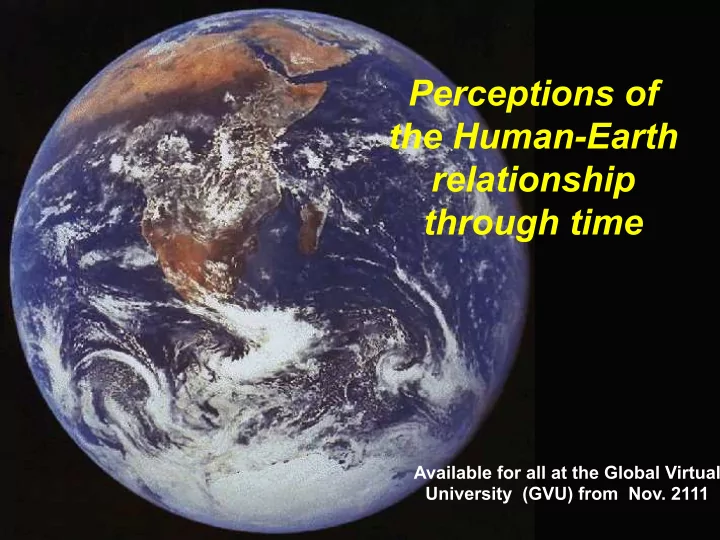

Sustainability Science Centre Perceptions of the Human-Earth relationship through time ”: njen, Available for all at the Global Virtual University (GVU) from Nov. 2111 11/3/11 s Dias 1
Sustainability Science Centre For most of recorded history, the Human-Earth Relationship was understood through religion – i.e. sun worship ”: njen, A solar deity (also sun god/dess ) is a deity who represents the Sun, or an aspect of it, usually by its perceived power and strength. Solar deities and sun worship can be found 11/3/11 s Dias 2 throughout most of recorded history in various forms. (Wikepedia 2011)
Sustainability Science Centre Galileo Galilei (1564-1642) • 1633: Forced by the church to denounce (with fingers crossed!) his belief that the Earth revolves around the sun – and not the reverse. • Pardoned in 1992, by Pope John Paul II who expressed regret for how the Galileo affair was handled, and issued a declaration acknowledging the errors committed by the Catholic Church ”: tribunal that judged the scientific njen, positions of Galileo Galilei , "Galileo, perhaps more than any other single person, was responsible for the birth of modern science“ Stephen Hawking, 1988 11/3/11 s Dias 3
Sustainability Science Centre Charles Darwin: 1809-1882 • On the Origin of Species (1859) Challenged the contemporary (religious based) understanding of the Human-Earth Relationship and the contemporary economic paradigm. • Over 150 years later, some ”: schools in the richest and njen, most powerful country on Earth refused to teach about Darwin’s results! House of Futures 02 November 2011 s Dias 4
Sustainability Science Centre Discovery that humans directly alter the Earth System (late 20th Century) Started with ”Climate Change” • • 2111 = approx. 490 ppm • 1834 Fournier – greenhouse effect (being reduced to 450) • 1896 Svante Arrhenius predicted global warming from the burning of 2011: 392 ppm fossil fuels ”: njen, 11/3/11 s Dias 5
Sustainability Science Centre • 2007 UN IPCC: > 90% probability humans causing climate change • 2009 ”COP 15”: scientific evidence accepted by world leaders • Approx. 97% researchers convinced; only ”: about 50% general population njen, 11/3/11 s Dias 6
The changing human enterprise, from 1750 to 2000 Note the start of the ’ Great Acceleration ’ around 1950, when many activities began or accelerated sharply Steffen et al. 2004 �
Responses of the Earth System to the accelerating human enterprise. Root cause = demand for resources approaching supply! ”Business as usual” not an option! Lord Nicholas Stern, 2009 Steffen et al. 2004
Earth System resources, goods and services Type of Service Ecosystem Earth System Provisioning Food Fossil Fuels Supporting Soil formation Upwelling branches of ocean circulation Regulating Ecological control Ozone formation in of pests and the stratosphere diseases Provisioning services are more commonly known as “resources”, and supporting and regulation services are sometimes known as “environmental resources”. From: Steffen, Persson, Deutsch, Zalasiewitz, Williams, Richardson, et al. 2011
Planetary Boundaries: Exploring the safe operating space for humanity in the Anthropocene ( Nature , 461 : 472 – 475, Sept 24 - 2009)
Enhedens navn O z o n e d e p l e t i o n ? Latest data ? ? 90-00 Nitrogen ? Ocean acidity flow 70-80 ? 50-60 ”: ? Pre- njen, Ind. Chemical Agricultural pollution land use Sted og dato s Dias 11
I = P x A x T • Equity issues profoundly complicate the challenge of global change. • In the Great Acceleration technology and especially consumption have overtaken population as a driver of change. National Geographic, March 2011
Sustainability Science Centre At the beginning of the 21st Century, it was recognised that for the first time in human history, that the demand for some essential natural resources was beginning to exceed supply: • ”Environment” could no longer be regarded as being distinct from economic interests • Future ”Economic growth” would have to be based on more efficient resource ”: use and/or the development of njen, alternatives for resources where supply cannot meet demand. 11/3/11 s Dias 13
Sustainability Science Centre ”Sustainable development” became quantifiable! • ”Sustainable” = demand for resources within the global supply • Requires natural science to quantify both supply and demand (and develop ”: alternatives) njen, social sciences to prioritise demands, influence behaviour, etc. 11/3/11 s Dias 14
Sustainability Science Centre Scientific thinking anno 2011: ” … the advent of the Anthropocene, the time interval in which human activities now rival ”: global geophysical processes, suggests that we njen, need to fundamentally alter our relationship with the planet we inhabit … ” 11/3/11 s Dias 15
Sustainability Science Centre McKinsey study released late November 2011: Demonstrated the economic consequenses of not curtailing resource demand. Study would not have been possible without a combination of contemporary natural science (i.e., ”: recent recognition of P scarcity) njen, and economic understanding 11/3/11 s Dias 16
100 years ago, many considered the challenge of sustainable development to be impossible! • The Earth was formed about 4.7 billion years ago • Our species in its present form has been on Earth for about ”: 250,000 years … njen, • About 10,000 generations … 17 • Most generations lived in caves … s
• In the course of only 1-2 generations, humans realised (thanks to natural science) that a major step in their development which had taken 6-8 generations (i.e. replacing animal power with machines) was destroying their own ”: habitat! njen, 18 s
That knowledge gave both the POWER and the RESPONSIBITY to change and to manage the Human- ”: Earth Relationship njen, We succeeded – but we only did so because we recognised the importance of cooperation between 19 s all of academic disciplines!
Recommend
More recommend